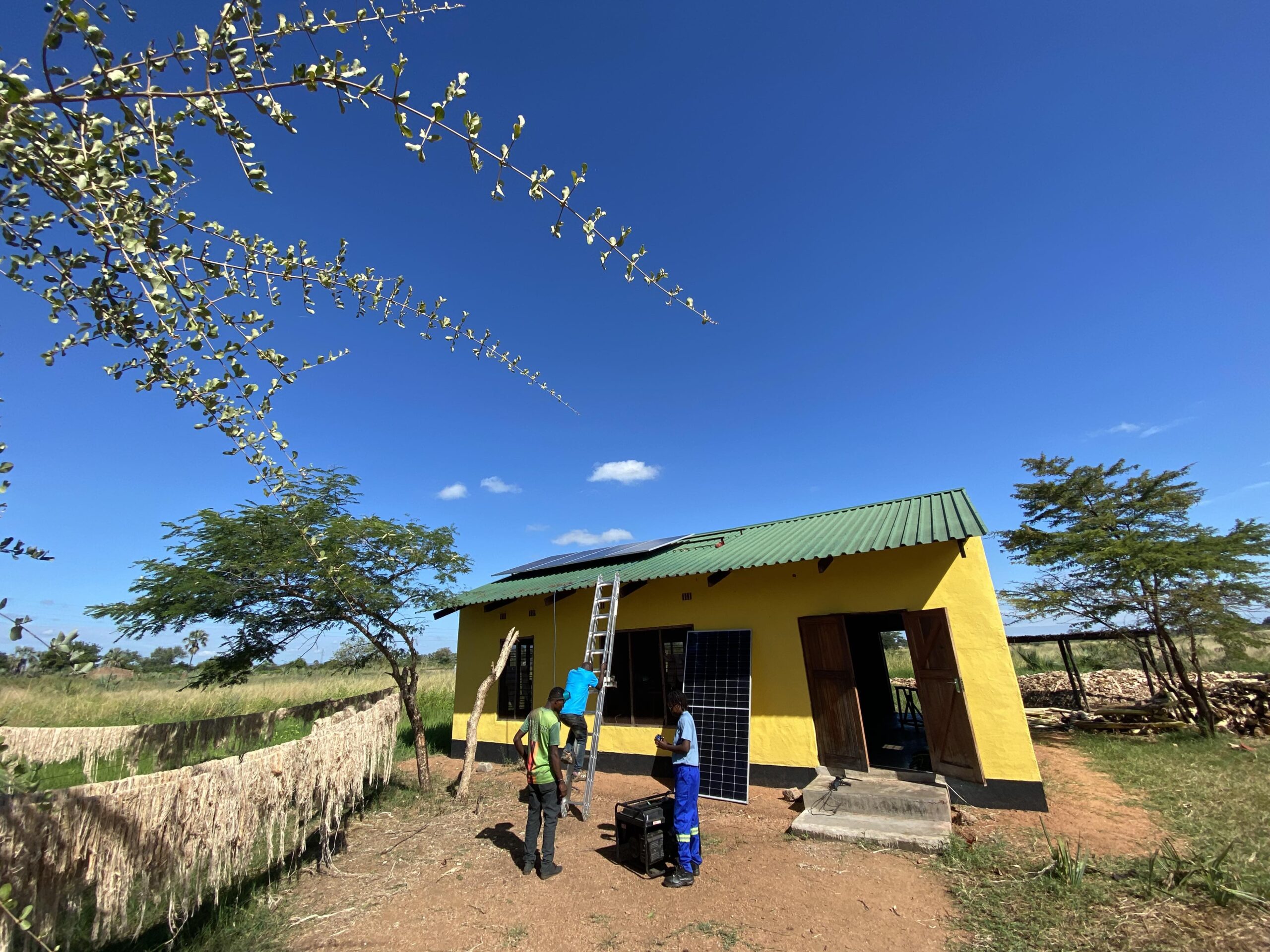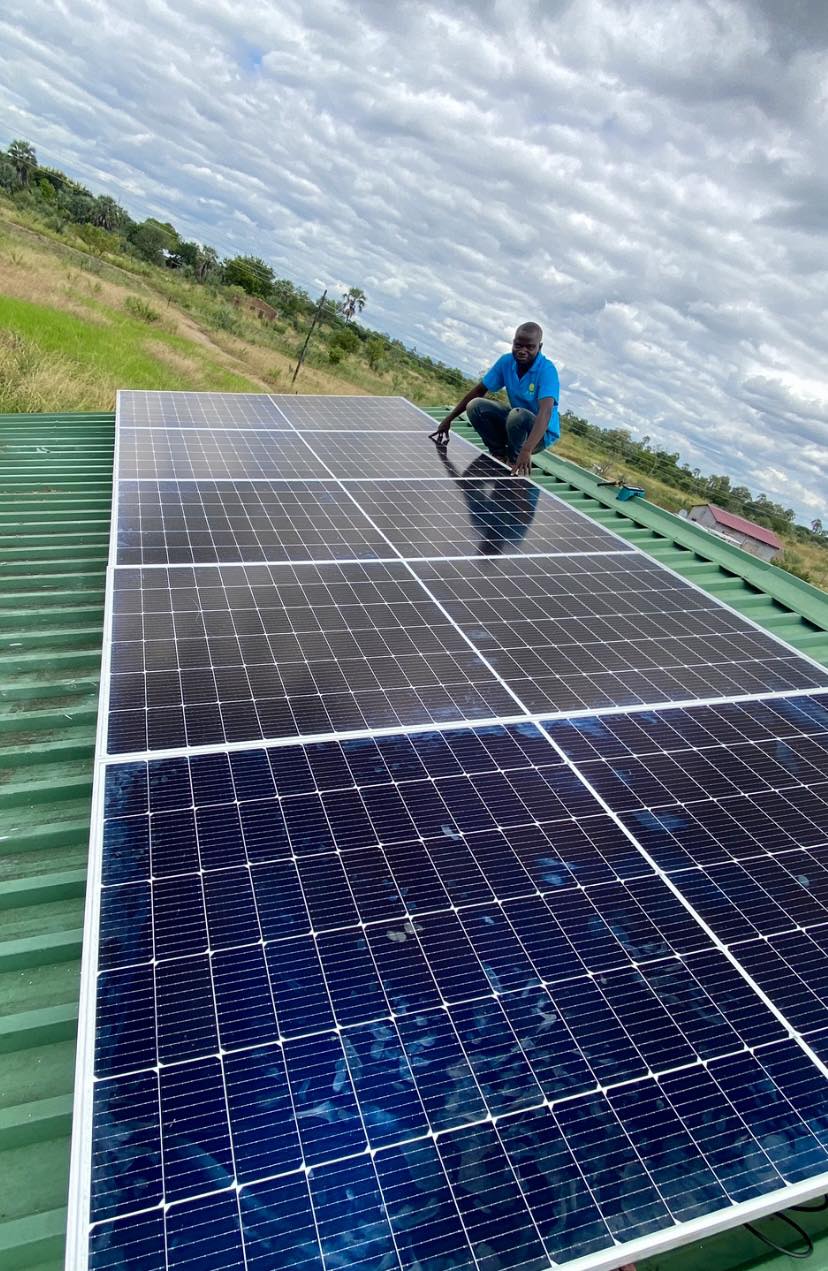
計画停電とソーラーパネル設置
2024.04.23
 (English below)
(English below)
ザンビアの雨季が明けはじめた3月上旬のこと、国営電力会社ZESCOから計画停電の知らせが届きました。
当初、雨季明けに送電網のメンテナンスを行うこともあるため、限定的だろうと言われていましたが、事態は思うより深刻でした。
昨年11月から今年3月までの雨季は雨量が少なく、ここザンビアの主食の原料であるとうもろこしが一部の地域を除き壊滅状態という話は聞いていました。そしてその影響は、国内電力の約83%(出典:ザンビアエネルギー省 2022年)を占める水力発電用のダムにも及んでいたのです。
雨季明けで、水が豊富にあるはずの3月にこういった事態になることは異例のことで、私たちの経験上も初めてのことです。
昨年と一昨年の雨季には、雨量が多すぎて、村が浸水したり、農作物が水浸しで根腐れするといったことが起きたばかりです。
「気候変動は現実だ」という言葉がタクシードライバーから出るほど、現地の人たちも身近に影響を感じています。
計画停電は、1日8時間。
3スケジュールに分けてエリア毎に実施され、1週間毎にスケジュールが変わる仕組みです。日中に停電があたる週は、勤務時間内に工場で電気が使える時間は1日で2時間だけです。
早朝勤務や夜勤を検討したものの、ゾウをはじめ野生動物が出る地域でもあり、チームメンバーの安全確保ができません。計画停電中は仕事をしない、という案もありましたが、とうもろこしの不作や食料の価格上昇の中でお給料が減ることはさらなる苦境です。
いつ終わるか分からない計画停電のスケジュール表を前に、途方にくれました。
この状況の中でも作業を続けられる方法として思いついたのは、ソーラーパネルの設置。
とは言うものの、手元に十分な資金はなく、無理を承知で日本のワンプラネット・ペーパー協議会のメンバー企業に緊急支援のお願いのメールを送ったところ、即座に支援を表明してくれるメンバー数社が現れ、1週間で設置に必要な金額を達成することができました。
ソーラーでバナナ繊維の生産!
これは工場をつくった当初からの夢でしたが、まさかこんな状況で実現するとは思っていませんでした。支援をしてくださったメンバー企業の皆さんに心から感謝します。
そこで早速、ソーラーシステム設置会社に注文をし、準備開始です。
導入するのは5.5 kWシステムで、2台のバナナ繊維とり機を動かす予定です。
10枚のパネルで、年間8000 kWh 以上の電力を生み出すということで、これは約2世帯の年間電力消費量(日本)に匹敵するそうです。
前払い分を送金した直後に、送金先の銀行が倒産(!)したり、必要な備品が価格急騰、などアフリカ・サプライズは続きますが、無事に着工。
あと、1週間後には完成予定です。完成のご報告を楽しみにしていてください!
In early March, when Zambia’s rainy season was beginning to end, we received a notice of rolling blackouts from the state-run electricity company ZESCO.
Initially, it was said that the situation would be limited because maintenance of the power grid is sometimes carried out at the end of the rainy season, but the situation turned out to be more serious than expected.
During the rainy season from November last year to March this year, there was little rainfall, and I had heard that corn, the staple food here in Zambia, had been destroyed in all but a few areas. The impact also extended to hydroelectric dams, which account for approximately 83% of the country’s electricity (Source: Zambia Ministry of Energy, 2022).
It is unusual for a situation like this to occur in March, when the rainy season is over and water is supposed to be plentiful, and this is also the first time in our experience.
During the rainy seasons last year and the year before, there was so much rainfall that villages were flooded and crops were flooded and their roots rotted.
It seems to be that the local people are feeling the effects close to them, as even taxi driver says, “Climate change is real.”
Planned power outages last for 8 hours a day.
The event is divided into 3 schedules and carried out in each area, and the schedule changes every week. On weeks when there is a power outage during the day, the factory only has electricity for 2 hours during working hours.
Although we considered working early morning or night shifts, the area is also home to elephants and other wild animals, making it impossible to ensure the safety of our team members. We also thought about to not work during the rolling blackouts, but with the loss of wages amid poor corn harvests and rising food price, it was not a good idea.
We were at a loss when faced with the schedule for rolling blackouts that we didn’t know when they would end.
Then we came up with the idea of installing solar panels as a way to continue working under these circumstances.
However, we did not have enough funds on hand, so we sent an email to member companies of Japan’s One Planet Paper Council requesting emergency support, and the number of members who immediately expressed their support was overwhelming. A company appeared and we were able to achieve the necessary amount for the installation within a week.
Production of banana fiber using solar power!
This has been a dream of ours since we first built the factory, but we never expected it to come true under these circumstances. We would like to express our sincere gratitude to all the member companies who supported us.
So, we immediately placed an order with a solar system installation company and began preparations.
A 5.5 kW system will be installed to run two banana fiber removal machines.
Ten panels generate over 8,000 kWh of electricity per year, which is equivalent to the annual electricity consumption of about two households in Japan.
Immediately after remitting the advance payment, the bank to which the remittance was made went bankrupt (!), and the price of necessary supplies skyrocketed, and other surprises continued to occur in Africa, but construction was successfully started.
It is expected to be completed in one week. Please look forward to the completion report!


